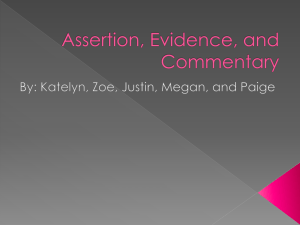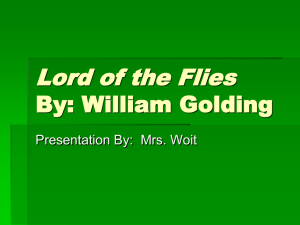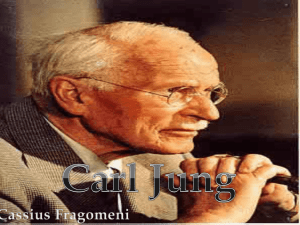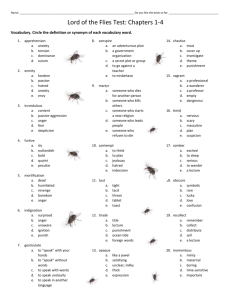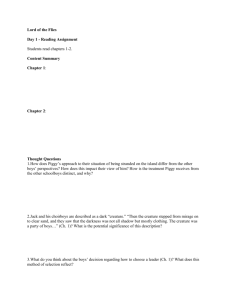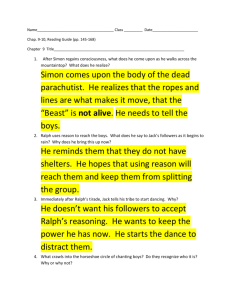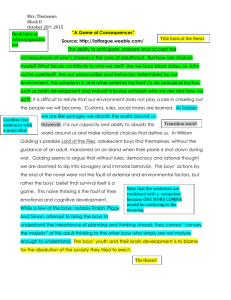Golding and Jung
advertisement
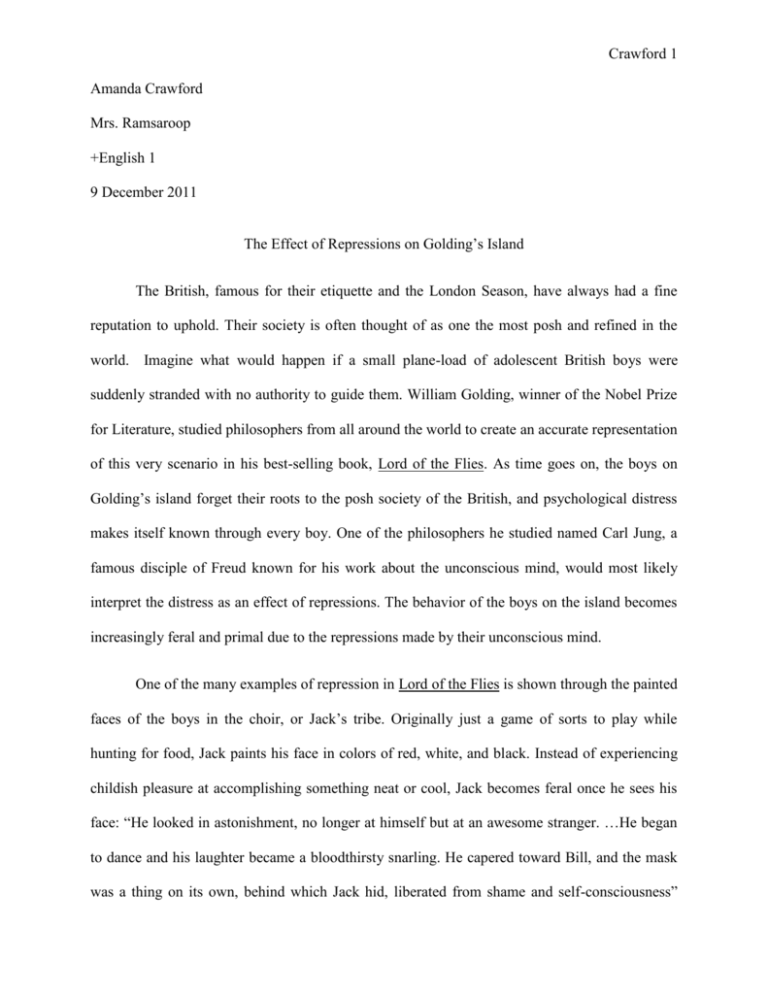
Crawford 1 Amanda Crawford Mrs. Ramsaroop +English 1 9 December 2011 The Effect of Repressions on Golding’s Island The British, famous for their etiquette and the London Season, have always had a fine reputation to uphold. Their society is often thought of as one the most posh and refined in the world. Imagine what would happen if a small plane-load of adolescent British boys were suddenly stranded with no authority to guide them. William Golding, winner of the Nobel Prize for Literature, studied philosophers from all around the world to create an accurate representation of this very scenario in his best-selling book, Lord of the Flies. As time goes on, the boys on Golding’s island forget their roots to the posh society of the British, and psychological distress makes itself known through every boy. One of the philosophers he studied named Carl Jung, a famous disciple of Freud known for his work about the unconscious mind, would most likely interpret the distress as an effect of repressions. The behavior of the boys on the island becomes increasingly feral and primal due to the repressions made by their unconscious mind. One of the many examples of repression in Lord of the Flies is shown through the painted faces of the boys in the choir, or Jack’s tribe. Originally just a game of sorts to play while hunting for food, Jack paints his face in colors of red, white, and black. Instead of experiencing childish pleasure at accomplishing something neat or cool, Jack becomes feral once he sees his face: “He looked in astonishment, no longer at himself but at an awesome stranger. …He began to dance and his laughter became a bloodthirsty snarling. He capered toward Bill, and the mask was a thing on its own, behind which Jack hid, liberated from shame and self-consciousness” 2 (Golding 63-64). His mask becomes a shield that protects him subconsciously, allowing him to be free of society’s grips over him and his appearance. Carl Jung describes the most likely cause for this behavior: Repressions are “infantile tendencies which are repressed (into the unconscious mind) because of their incompatible character” (Jung 486). Jack’s response to his new, more warrior-like look is most likely cause by a past repression of his. When Jack is introduced in the beginning of the book, he is described as not very attractive. He had become so accustomed to society’s trampling of his self-esteem that once he is finally free of its prejudices, he becomes feral, and unleashes all of his repression in a sudden, explosive burst of emotion. Jung also describes this in his essay, “The Personal and Collective Unconscious”: “Repression is a process that begins in early childhood under the moral influence of the environment and lasts throughout life. Through analysis the repressions are removed and the repressed wishes made conscious” (Jung 486). Jack’s unconscious mind held onto his repressed feelings. But when the mask is put on, he is free of such notions, and he reacts in the only way he can: with primal instincts. Another example of the effects of repressions made on the island is shown during the last, big tribal dance that Ralph and Piggy attended. All of the boys present at the dance are scared of the dark forest, which supposedly holds the mysterious beast, and the thunderstorm slowing crawling up towards the island. As a way to let of their fears, the boys repress them into their unconscious mind and let their natural instincts of defense come out. The boys begin to dance around, chanting: “Kill the beast! Cut his throat! Spill his blood!” as they become unaware of their controlling minds (Golding 152). When a shadow of a creature appears and moves the middle of their group, screaming nonsense, the boys, left with only their primal instincts, become territorial and defensive: “The beast struggled forward, broke the ring, and fell over the steep edge of the rock to the sand by the water. At once the crowd surged after it, poured down the 3 rock, leapt onto the beast, screamed, struck, bit, tore. There were no words, and no movements but the tearing of teeth and claws” (Golding 153). The boys, terrified at the thought of the beast having found them, begin to attack “the beast”, while somewhere in their repressed thoughts, a voice screams out against their instincts. The voice realizes what is really happening; the creature was no beast, but a human, and their friend, Simon. Jung references this further in his essay. “…in addition to the repressed material the unconscious contains all those psychic components that have fallen below the threshold, including subliminal sense perceptions. …the unconscious also contains components that have not yet reached threshold of consciousness” (Jung 486). Their unconscious mind realizes that the beast is really Simon, but their instincts left no room for society’s terms. Their guilt eventually reaches consciousness though, and it is shown through Jack’s tribe. The day after the killing, Jack and his tribe gathered to talk about the beast. Roger, thinking that the beast they killed is dead, spoke up his concerns but Jack viscously shoots them down. “In the silence that followed, each savage flinched away from his individual memory. ‘No! How could we—kill—it?’ Half-relieved, half-daunted by the implication of further terrors, the savages murmured again” (Golding 160-161). The group of savages suspects their wrongdoing, but instead of facing it they chose to repress it further, claiming that the beast was not killed and protecting themselves against any further thoughts of committing second-degree murder. But eventually, all of the boys’ repressions come back to haunt them as the final pages finally end the madness. The repressions made by the boys’ unconscious minds causes turmoil and insanity to rip through the morals once ingrained into them by society. The boys’ unique situation provides most of them with the freedom to do whatever they want. Society, which had been the original instigator of their repressions, is no longer there to guide them, both physically and mentally. 4 Without anything to keep the repressions in the unconscious mind, they burst into the conscious behaviors of every single boy. Golding’s island provides 21st century readers with a look into a world where all repressions are made known without warning; a dangerous world filled with death and moral destruction caused by once refined British boys. 5 Works Cited Golding, William. Lord of the Flies. New York: Penguin Group Inc., 1954. Print. Jung, Carl. "The Personal and Collective Unconscious." A World of Ideas. Ed. Lee A. Jacobus. 7th ed. Boston & New York: Bedford/St. Martins, 2006. 486. Print.
